Related Research Articles

Local government in Scotland comprises thirty-two local authorities,commonly referred to as councils. Each council provides public services,including education,social care,waste management,libraries and planning. Councils receive the majority of their funding from the Scottish Government,but operate independently and are accountable to their local electorates. Councils raise additional income via the Council Tax,a locally variable domestic property tax,and Business rates,a non-domestic property tax.
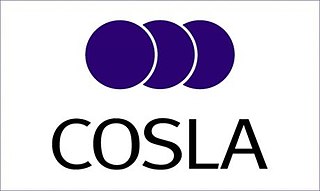
The Convention of Scottish Local Authorities (COSLA) is the national association of Scottish councils and acts as an employers' association for its 32 member authorities.

Perth and Kinross Council is the local government council for the Perth and Kinross council area of Scotland. It employs around 6,000 people.

John Gordon Wilson is a Scottish politician. He was formerly a Member of the Scottish Parliament (MSP) for the Central Scotland region from 2007 until 2016. He sat as a Scottish National Party (SNP) member and then as an independent after 2014. He stood unsuccessfully as a Green Party candidate in the Coatbridge and Chryston constituency at the 2016 Scottish Parliament election and then as an independent candidate in the 2017 Scottish local elections.
Marco Biagi is a Scottish National Party (SNP) politician. He served as the Minister for Local Government and Community Empowerment from 2014 to 2016,and as the Member of the Scottish Parliament (MSP) for Edinburgh Central from 2011 to 2016.
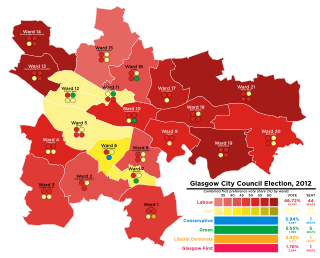
Elections to Glasgow City Council were held on 3 May 2012,the same day as the other Scottish local government elections. The election was the second using 21 new wards created as a result of the Local Governance (Scotland) Act 2004,each ward elected three or four councillors using the single transferable vote system form of proportional representation.

Elections to East Ayrshire Council were held on 3 May 2012,the same day as the other Scottish local government elections. The election is the second using 9 new wards created as a result of the Local Governance (Scotland) Act 2004,each ward elected three or four councillors using the single transferable vote system form of proportional representation. The new wards replaced 32 single-member wards which used the plurality system of election.
Elections to Falkirk Council were held on 3 May 2012,the same day as the 31 other local authorities in Scotland. The election used the nine wards created under the Local Governance (Scotland) Act 2004,with 32 councillors being elected. Each ward elected either 3 or 4 members,using the STV electoral system.

Andrew Egan Henderson Hendry,known as Drew Hendry,is a Scottish National Party (SNP) politician serving as Member of Parliament (MP) for Inverness,Nairn,Badenoch and Strathspey since 2015. Hendry has served as the SNP's Economy Spokesperson in the House of Commons since September 2023.
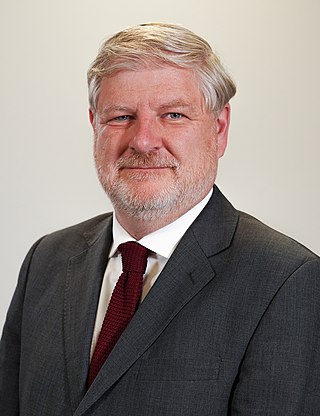
There was a Scottish National Party leadership election to choose the new Depute leader of the Scottish National Party at the SNP's conference on 14–15 October 2016. The SNP's Westminster Group Leader Angus Robertson MP won the election.

The elections to the City of Edinburgh Council were held on Thursday 4 May 2017,on the same day as the 31 other local authorities in Scotland. It was the third successive Local Council election to run under the single transferable vote (STV) electoral system.

The Glasgow City Council election of 2017 was held on 4 May 2017,the same day as the 31 other Scottish local government elections. The election was the first to use 23 new wards,created as a result of the Local Government Boundary Commission for Scotland's 5th Review. Each ward elected three or four councillors using the single transferable vote system,a form of proportional representation used since the 2007 election and according to the Local Governance (Scotland) Act 2004.
2017 Elections to Falkirk Council were held on 4 May 2017,the same day as the 31 other local authorities in Scotland. The election used the nine wards created under the Local Governance (Scotland) Act 2004,with 30 councillors being elected,a reduction of 2 members from 2012. Each ward elected either 3 or 4 members,using the STV electoral system.
2017 Elections to North Lanarkshire Council were held on 4 May 2017,on the same day as the 31 other local authorities in Scotland. The election utilised twenty-one wards with 77 Councillors being elected. This represented an increase of 7 seats and 1 additional ward when compared to 2012. Each ward elected either 3 or 4 members,using the STV electoral system.

Canal is one of the 23 wards of Glasgow City Council. Since its creation in 2007 it has returned four council members,using the single transferable vote system. For the 2017 Glasgow City Council election,the boundaries were changed and the ward decreased in population,but continued to return four councillors.
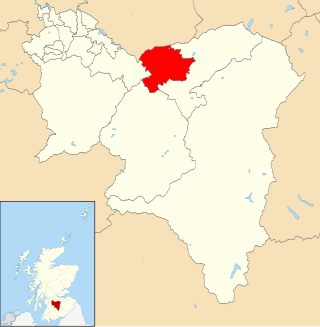
Clydesdale West is one of the 20 electoral wards of South Lanarkshire Council. Created in 2007,the ward elects four councillors using the single transferable vote electoral system and covers an area with a population of 19,350 people.

Elections to the City of Edinburgh Council took place on 5 May 2022 on the same day as the 31 other Scottish local government elections. As with other Scottish council elections,it was held using single transferable vote (STV) –a form of proportional representation –in which multiple candidates are elected in each ward and voters rank candidates in order of preference.

Elections to Glasgow City Council took place on 5 May 2022 on the same day as the 31 other Scottish local government elections. As with other Scottish council elections,it was held using single transferable vote (STV) –a form of proportional representation –in which multiple candidates are elected in each ward and voters rank candidates in order of preference.
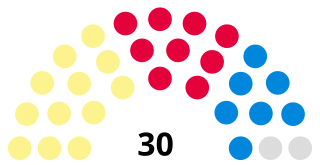
The 2022 elections to Falkirk Council were held on 5 May 2022 on the same day as the 31 other Scottish local government elections. The election will use the nine wards created following the Local Government Boundary Commission for Scotland's 5th Review,with 30 councillors being elected. Each ward elected either three or four members,using the STV electoral system.
Elections to North Lanarkshire Council took place on 5 May 2022 on the same day as the 31 other Scottish local government elections. As with other Scottish council elections,it was held using single transferable vote (STV) –a form of proportional representation –in which multiple candidates are elected in each ward and voters rank candidates in order of preference.
References
- 1 2 "The Times Guide to the House of Commons 1997", Times Books, 1997, p. 137.
- ↑ "Falkirk's SNP chief quits as group boss". Falkirk Herald. 2 June 2012. Retrieved 17 October 2015.
- ↑ "Scottish Ambulance Service Directors". Archived from the original on 3 March 2016. Retrieved 8 December 2010.
- 1 2 "Red blood in main artery". The Herald . 1 April 1997. Retrieved 17 October 2015.
- ↑ "Cllr David Alexander". Falkirk Council. Retrieved 17 October 2015.
- ↑ "Best value profile: David Alexander". Local Government Chronicle . 1 September 2000. Retrieved 17 October 2015.
- ↑ "Andrew quits". Linlithgow Gazette. 15 February 2007. Retrieved 17 October 2015.
- ↑ "Falkirk Labour leader backs bid to rejoin COSLA fold". The Scotsman . 1 June 2007. Retrieved 17 October 2015.
- ↑ Robbie Dinwoodie, "Fallen SNP duo look ahead to back benches", The Herald, 13 September 2004, p. 7.
- ↑ "SNP Falkirk press release" . Retrieved 8 December 2010.
- ↑ "Scottish Ambulance Service" (Press release). Scottish Government. 16 October 2008. Retrieved 17 October 2015.